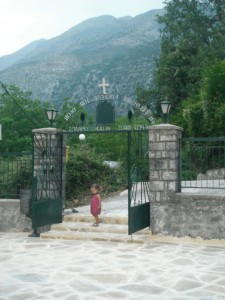 After a whirlwind three weeks of weddings (my cousin’s on the Peloponnesian coast), ruins (the Byzantine city of Butrint in what is now Albania), and beaches (too numerous to mention), I thought we’d end our annual trip to Greece with a few relaxing days in Lia, the quiet village where my father was born, which clings stubbornly to the side of a Greek mountaintop.
After a whirlwind three weeks of weddings (my cousin’s on the Peloponnesian coast), ruins (the Byzantine city of Butrint in what is now Albania), and beaches (too numerous to mention), I thought we’d end our annual trip to Greece with a few relaxing days in Lia, the quiet village where my father was born, which clings stubbornly to the side of a Greek mountaintop.
Boy, was I wrong. We arrived in Lia just in time for the panegyri, the annual festival of the Prophet Elias, which celebrates both the saint and our village, of which he is the patron. There was a pretty good crowd—about 200 people gathered around the plane trees eating roast lamb and listening to the strains of the clarinet. But a few notable villagers were missing. As I sat there waiting for the dance floor to fill, I heard scraps of conversation that revealed an intervillage controversy: this clarinetist was not the usual gentleman hired for the event each year; he and the organizers of the panegyri couldn’t agree on a fee. (No such problem with the price of food; one woman told me that somewhere in the Peloponnese, a government official decreed that since there’s an economic crisis going on, the price of lamb on the spit could be no more than 18 Euros per kilo. Now that’s austerity measures I can get behind!)
Angry that their friend, fellow villager, and favorite clarinetist had been passed over, a gang of Liotes had arranged for a rival party at the local Inn that very night in an attempt to sabotage the panegyri! If only I had the skills to set the stand-off to music, the world would gain a song known as Dueling Clarinets. But no such luck.
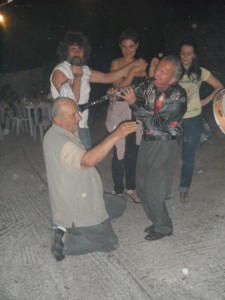 Finally, a villager named Socrates, whom my mother and I call John the Baptist because of his startling resemblance to Jesus’s cousin, seized the microphone and gave an impassioned speech, peppered with not-fit-for-a-family-blog expletives, insisting that we must all pull together as a community for our annual festival, and calling on his uncle, Barba Dionysis, to start the dancing. Belying his years (and girth), Barba D kicked off the dancing with such passion that the clarinetist was compelled to get down with him. My friend who worked the panegyri, selling fairly-priced roast lamb, didn’t get home until five AM.
Finally, a villager named Socrates, whom my mother and I call John the Baptist because of his startling resemblance to Jesus’s cousin, seized the microphone and gave an impassioned speech, peppered with not-fit-for-a-family-blog expletives, insisting that we must all pull together as a community for our annual festival, and calling on his uncle, Barba Dionysis, to start the dancing. Belying his years (and girth), Barba D kicked off the dancing with such passion that the clarinetist was compelled to get down with him. My friend who worked the panegyri, selling fairly-priced roast lamb, didn’t get home until five AM.
She told me this the next morning at nine, when we all met at the top of the mountain for a church service in the chapel of the Prophet Elias. When I was younger and would hike to the mountaintop chapel on my yearly visits to Lia, the villagers always encouraged me to ring the bell so that they could hear it in Albania, where the Orthodox weren’t allowed to practice their religion (and neither was anyone else, for that matter). But that was before the fall of communism in Albania, and now the borders are fluid for people to pass back and forth.
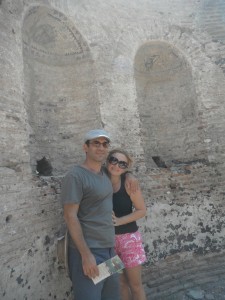 It’s a privilege I enjoyed a few weeks ago when my husband and I found ourselves spending the four year anniversary of our first date in Albania, touring the ruins of Butrint. At the time, all our driver could talk about was the fact that two Albanian criminals who had busted out of a Greek jail four months ago, killing a guard and a young woman whose car they stole, had been sighted in northern Greece and were believed to be making their way to the Albanian border.
It’s a privilege I enjoyed a few weeks ago when my husband and I found ourselves spending the four year anniversary of our first date in Albania, touring the ruins of Butrint. At the time, all our driver could talk about was the fact that two Albanian criminals who had busted out of a Greek jail four months ago, killing a guard and a young woman whose car they stole, had been sighted in northern Greece and were believed to be making their way to the Albanian border.
So perhaps I should not have been surprised yesterday afternoon when I brought Amalia to the village playground after the Sunday liturgy in church, and found it crawling with cops wielding machine guns. The four officers had been up all night they told me, because at 4:30 in the morning, in the village of Vrosina about a 20-minute drive down the mountain—where we had stopped to stock up on groceries before our arriving in Lia—there had been a shootout between the Albanian fugitives and a cadre of Greek cops. One of the criminals was killed, and a Greek policeman had been shot in the leg, but was on the mend in a hospital in Ioannina, the nearest large city. The fugitives had been hiding along the banks of the Kalamas river, apparently planning to walk up the mountain and into Albania under cover of night and panegyria—it’s festival season in the region, and they figured that any wanderers spotted in the wee hours of the morning could pass as revelers heading home from a night of clarinet-fuelled dance-offs and 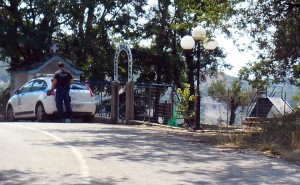 polyphonic singing.
polyphonic singing.
And so Lia was on lockdown yesterday. Local ladies brought tiganites (our version of pancakes) and, later in the day, olives to the cops manning the playground at the edge of the village. But this morning, when Amalia and I returned to the slide, the men in blue were gone. The second fugitive has yet to be found, but they’re closing in on him farther down the mountain, I’ve been assured by the men who sit around the courtyard in front of the inn, drinking coffee and moonshine and discussing everything that goes on in the world over the rhythmic clack of backgammon discs.
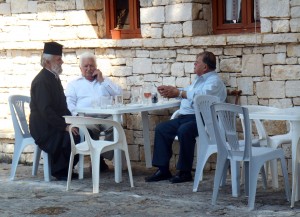 So there’s a man on the lam who has lost his partner in crime, and a gauntlet has been thrown down for next year’s panegyri. None of it fazes my toddler Amalia, who is having the time of her life eating ice cream and chasing the big kids who will let her play around the courtyard of the inn. As she does so, she yells “running in the street! Running in the street!” gleefully thinking she’s breaking one of our biggest rules.
So there’s a man on the lam who has lost his partner in crime, and a gauntlet has been thrown down for next year’s panegyri. None of it fazes my toddler Amalia, who is having the time of her life eating ice cream and chasing the big kids who will let her play around the courtyard of the inn. As she does so, she yells “running in the street! Running in the street!” gleefully thinking she’s breaking one of our biggest rules.
So, once again, Amalia is forcing me to re-learn one of the biggest lessons toddlers teach: whatever drama is going on around me, for everyone else, life goes on.
And Lia has re-taught me what I spent a year learning when I lived here researching my travel  memoir, North of Ithaka. No place is too small or too remote for the intrigue and passion of human existence to wreak havoc in it. No life is boring. Everyone has his or her secret, and everywhere has its criminals and crack clarinetists (give or take the clarinet). It’s always the best of times and the worst of times. And all you can do is jump right in and become a character in the spectacle.
memoir, North of Ithaka. No place is too small or too remote for the intrigue and passion of human existence to wreak havoc in it. No life is boring. Everyone has his or her secret, and everywhere has its criminals and crack clarinetists (give or take the clarinet). It’s always the best of times and the worst of times. And all you can do is jump right in and become a character in the spectacle.